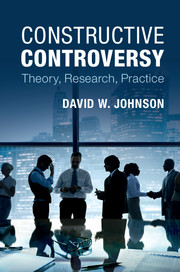Book contents
- Frontmatter
- Contents
- List of figures
- List of tables
- Acknowledgments
- 1 Underlying foundations of constructive controversy
- 2 The nature of constructive controversy
- 3 Theory of constructive controversy
- 4 The processes of constructive controversy and concurrence seeking
- 5 The outcomes of constructive controversy
- 6 Conditions mediating the effects of constructive controversy
- 7 Constructive controversy and decision making
- 8 Constructive controversy in education
- 9 Constructive controversy and political discourse in democracies
- 10 Constructive controversy, creativity, and innovation
- 11 Constructive controversy and building and maintaining peace
- 12 Conclusions
- References
- Index
9 - Constructive controversy and political discourse in democracies
Published online by Cambridge University Press: 05 June 2015
- Frontmatter
- Contents
- List of figures
- List of tables
- Acknowledgments
- 1 Underlying foundations of constructive controversy
- 2 The nature of constructive controversy
- 3 Theory of constructive controversy
- 4 The processes of constructive controversy and concurrence seeking
- 5 The outcomes of constructive controversy
- 6 Conditions mediating the effects of constructive controversy
- 7 Constructive controversy and decision making
- 8 Constructive controversy in education
- 9 Constructive controversy and political discourse in democracies
- 10 Constructive controversy, creativity, and innovation
- 11 Constructive controversy and building and maintaining peace
- 12 Conclusions
- References
- Index
Summary
INTRODUCTION
In 1859 Horace Greeley and Henry David Thoreau were having a discussion about John Brown's exploits at Harper's Ferry. “No matter how well intended John Brown was,” Horace said, “his methods were completely unacceptable. The man broke the law! Terrorism for a good cause is still terrorism. It does not follow that because slavery is wrong, John Brown's actions were right. No matter how opposed to slavery one is, one cannot condone what John Brown did.” “Now Horace,” Henry replied, “you are missing the whole point. It does not matter whether John Brown broke the law or not. It only matters what he symbolizes. And he symbolizes eternal justice, glory, and devotion to principle. We should pay homage to the ideals John Brown represents, not get caught in a mundane discussion of legalities.”
Thomas Jefferson, James Madison, and the other founders of the United States would have applauded Greeley and Thoreau's discussion. They believed that free and open discussion should serve as the basis of influence within society (not the social rank within which a person was born). This free and open discussion was to be characterized by conflict among ideas and opinions, open-minded consideration of all points of view, and changing one's mind in order to find the best action to take for the good of the country as a whole. Jefferson had a deep faith in the value and productiveness of conflict. Thomas Jefferson noted, “Differences of opinion lead to inquiry, and inquiry to truth.” James Madison described political discourse as (a) including open-minded consideration of other points of view (“much is gained by a yielding and accommodating spirit”) and (b) keeping conclusions tentative by realizing that one's current knowledge is not the whole truth (no citizen is “obligated to retain his opinions any longer than he is satisfied of their propriety and truth”). Citizens in our democracy are expected to advocate conflicting positions while keeping an open mind and keeping conclusions tentative.
- Type
- Chapter
- Information
- Constructive ControversyTheory, Research, Practice, pp. 153 - 164Publisher: Cambridge University PressPrint publication year: 2015



